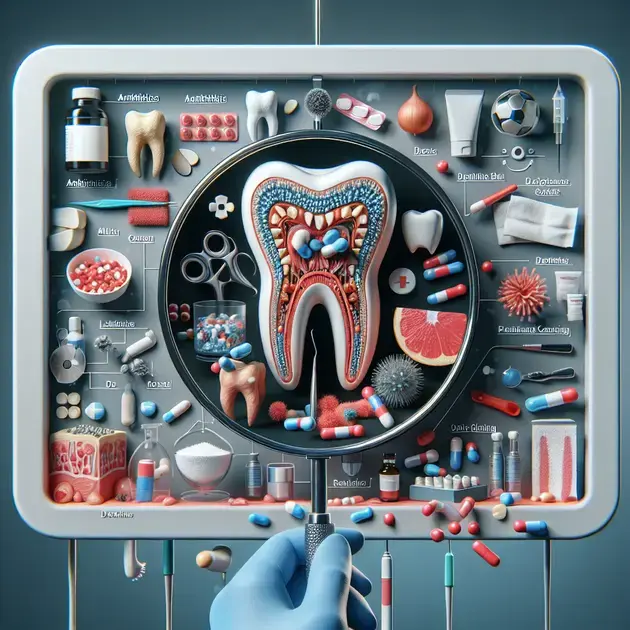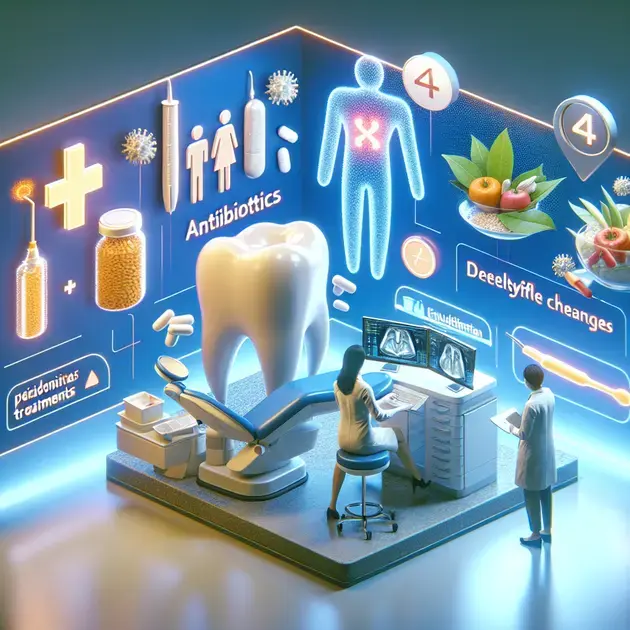Dealing with periodontitis can be challenging, but with the right medication, it is possible to effectively manage this condition. In this comprehensive guide, we will explore the best strategies and treatments available to help you combat periodontitis and restore your oral health.
Recent studies have shown that a combination of antibiotics and deep cleaning procedures, such as scaling and root planing, can be highly effective in treating periodontitis. By following a personalized treatment plan prescribed by your dentist, you can improve the health of your gums and prevent further progression of this chronic inflammatory disease.

Effective Strategies for Managing Periodontitis
Periodontitis is a serious gum infection that damages the soft tissue and destroys the bone that supports your teeth. It can lead to tooth loss if left untreated. Here are some effective strategies for managing periodontitis:
1. Regular Dental Check-ups:
Schedule regular visits to your dentist for check-ups and professional cleanings. This will help detect any signs of periodontitis early on and prevent it from progressing.
2. Good Oral Hygiene:
Brush your teeth at least twice a day and floss daily to remove plaque and prevent gum disease. Consider using an electric toothbrush and antimicrobial mouthwash for better results.
3. Healthy Diet:
Eat a balanced diet rich in nutrients to support overall oral health. Avoid sugary and acidic foods that can contribute to gum inflammation and periodontal disease.
4. Quit Smoking:
Smoking weakens your immune system and makes it harder for your body to fight off infections, including gum disease. Quitting smoking can improve your oral health significantly.
5. Stress Management:
Stress can weaken your immune system and make you more vulnerable to infections. Practice stress-reducing techniques such as meditation, yoga, or deep breathing exercises to help manage your overall health.
The Power of Antibiotics and Deep Cleaning Procedures
Antibiotics and deep cleaning procedures are powerful tools in the treatment of periodontitis. They can help eliminate bacteria and infection from your gums, promoting healing and preventing further damage. Here’s how these treatments can benefit your oral health:
1. Antibiotic Therapy:
Your dentist may prescribe antibiotics to help control bacterial infections in your gums. These medications can be in the form of pills, mouth rinses, or gels that are applied directly to the affected areas.
2. Scaling and Root Planing:
This deep cleaning procedure involves removing plaque and tartar from below the gumline to promote gum healing and prevent disease progression. It helps smooth the root surfaces to discourage future bacterial growth.
3. Laser Therapy:
Laser technology can be used to target and remove infected tissue while promoting the regeneration of healthy gums. This minimally invasive procedure can help reduce inflammation and improve overall gum health.
4. Periodontal Surgery:
In severe cases of periodontitis, surgical intervention may be necessary to repair the damage caused by the disease. Your dentist may recommend procedures such as gum grafting or bone regeneration to restore oral health.
5. Follow-up Care:
After undergoing antibiotic therapy and deep cleaning procedures, it’s essential to maintain good oral hygiene practices and attend regular dental check-ups to monitor your gum health and prevent any recurrence of periodontitis.
Personalized Treatment Plans for Optimal Oral Health
Creating a personalized treatment plan for optimal oral health is crucial in managing periodontitis effectively. Your dentist will tailor a plan based on your specific needs and the severity of your condition. Here’s what you can expect from a personalized treatment plan:
1. Comprehensive Examination:
Your dentist will conduct a thorough examination of your teeth, gums, and overall oral health to assess the extent of periodontitis and determine the best course of treatment.
2. Customized Treatment Options:
Based on the examination results, your dentist will recommend personalized treatment options that may include deep cleaning procedures, antibiotic therapy, surgical intervention, or a combination of these treatments.
3. Lifestyle and Oral Hygiene Counseling:
Your dentist will provide guidance on maintaining good oral hygiene practices at home and making lifestyle changes, such as quitting smoking or improving your diet, to support the healing process and prevent future gum disease.
4. Regular Monitoring and Follow-up:
After initiating treatment, your dentist will schedule regular follow-up appointments to monitor your progress and make any necessary adjustments to your treatment plan. This ongoing care is essential for achieving optimal oral health.
5. Patient Education and Support:
Your dentist will educate you on the importance of oral health and empower you to take control of your dental care. By understanding the factors contributing to periodontitis, you can actively participate in your treatment and maintain a healthy smile for years to come.

1. **
Effective Strategies for Managing Periodontitis**
Periodontitis is a serious gum infection that damages the soft tissue and destroys the bone that supports your teeth. It is essential to implement effective strategies to manage and treat this condition to prevent further complications. Here are some key strategies for managing periodontitis:
1. Daily Oral Hygiene Routine
One of the most important strategies for managing periodontitis is to maintain a consistent and thorough oral hygiene routine. This includes brushing your teeth at least twice a day, flossing daily, and using an antiseptic mouthwash to reduce plaque and bacteria buildup.
2. Regular Dental Check-ups
Scheduling regular dental check-ups with your dentist is crucial for managing periodontitis. Your dentist can monitor the progression of the disease, provide professional cleanings, and offer personalized treatment plans to address your specific needs.
3. Antibiotic Therapy
In some cases, your dentist may recommend antibiotic therapy to help control the bacterial infection causing periodontitis. Antibiotics can be prescribed in various forms, such as pills, mouth rinses, or gels, to target and eliminate the harmful bacteria in your gums.
4. Deep Cleaning Procedures
Deep cleaning procedures, also known as scaling and root planing, are essential for managing periodontitis. This non-surgical treatment involves removing plaque and tartar from below the gum line and smoothing the root surfaces to promote healing and prevent further infection.
5. Lifestyle Changes
Making positive lifestyle changes, such as quitting smoking, eating a balanced diet, and managing stress, can also help manage periodontitis. These changes can reduce inflammation in the gums and improve overall oral health.
2. **
The Power of Antibiotics and Deep Cleaning Procedures**
When it comes to treating periodontitis, antibiotics and deep cleaning procedures play a crucial role in controlling the infection and restoring gum health. Understanding the power of these treatments can help individuals effectively manage their periodontal condition. Here is how antibiotics and deep cleaning procedures can make a difference:
1. Antibiotics for Infection Control
Antibiotics are prescribed to combat the bacterial infection that causes periodontitis. These medications can target specific strains of bacteria, reduce inflammation, and promote healing in the gums. It is essential to follow your dentist’s instructions carefully when taking antibiotics to ensure their effectiveness.
2. Deep Cleaning for Plaque and Tartar Removal
Deep cleaning procedures, such as scaling and root planing, are performed to remove plaque and tartar buildup from below the gum line. This thorough cleaning process helps eliminate bacteria and toxins that contribute to gum inflammation and bone loss. Deep cleaning can effectively reset the health of the gums and prevent further progression of periodontitis.
3. Combination Therapy for Optimal Results
In some cases, a combination of antibiotics and deep cleaning procedures may be recommended for optimal results in managing periodontitis. This comprehensive approach targets the infection from multiple angles, maximizing the chances of successful treatment and long-term gum health.
4. Professional Monitoring and Maintenance
After undergoing antibiotic therapy and deep cleaning, it is important to have regular follow-up appointments with your dentist for monitoring and maintenance. Your dentist can evaluate the progress of your treatment, provide additional cleanings if needed, and offer guidance on how to maintain good oral hygiene habits at home.
5. Patient Education and Support
Understanding the power of antibiotics and deep cleaning procedures empowers patients to take an active role in managing their periodontitis. By staying informed, following treatment recommendations, and seeking support from dental professionals, individuals can effectively combat this common oral health condition and preserve their smiles.
**
conclusão
**
Effective periodontitis management requires a multifaceted approach that combines diligent oral hygiene practices, regular dental check-ups, antibiotic therapy, deep cleaning procedures, and positive lifestyle changes. By maintaining a daily oral hygiene routine that includes brushing, flossing, and using mouthwash, individuals can reduce plaque buildup and bacterial infection, key contributors to periodontitis progression.
Regular dental check-ups are vital for monitoring the disease’s advancement and receiving personalized treatment plans from professionals. Antibiotic therapy, whether in pill form, mouth rinses, or gels, targets and eliminates harmful bacteria, aiding in infection control and gum healing. Deep cleaning procedures such as scaling and root planing remove plaque and tartar beneath the gum line, promoting healing and preventing further infection.
By incorporating lifestyle changes like smoking cessation, balanced diet adoption, and stress management, individuals can further manage periodontitis and improve gum health. Understanding the power of antibiotics and deep cleaning procedures empowers patients to actively engage in their treatment, maximizing the chances of successful management and long-term oral health preservation.



